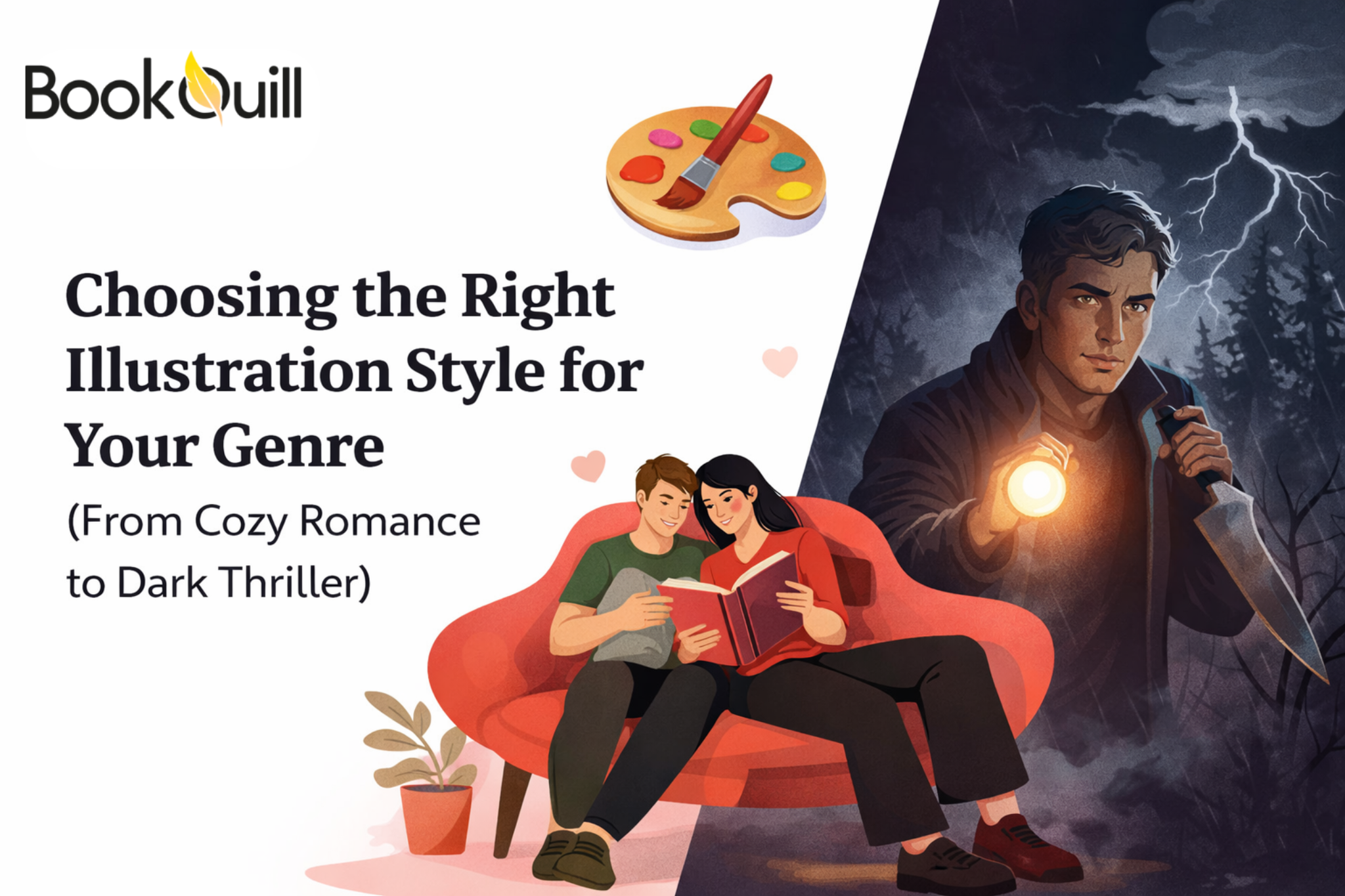Table of Contents
Explore Blogs
Trending on Ebook
What Is Hip-Hop Ghostwriting? Everything You Need to Know

The words you’re vibing to aren’t written by your favorite vocalist. Yes, you have read it right. So many singers are singing hip-hop songs that they didn’t write. Then who wrote them, and why is the person whose original content they are using in their song not claiming copyright? Because they are all written by hip-hop ghostwriting services.
This is a secret part of the industry that’s been both celebrated and criticized. Ghostwriters often sign agreements that transfer the copyright to the artist who performs the song so that they can maintain anonymity. Let’s discover who these services are, what their actual job is, and more.
Key Takeaways
- What Ghostwriters for Hip Hop Do – They collaborate with rappers and music producers to write lyrics for their songs. No one knows their name, and their efforts remain behind the scenes.
- Legal or Illegal – Ghostwriting in hip-hop is not illegal. However, it raises ethical questions about authenticity and transparency. It upset purists as they believe rappers should write their own lyrics.
- Ghostwriters Can’t Claim Copyrights – They usually do not hold the right to the lyrics they create. Instead, the performing artist or the record label usually retains the rights.
- What These Writers Get in Return – They receive financial compensation for their work, which can range from flat fees to ongoing royalties, depending on the agreement.
What Is Hip-Hop Ghostwriting?
It’s when someone writes lyrics for a rapper without getting public credit. The ghostwriter stays behind the scenes while the rapper takes center stage, spitting those bars as if they’re their own. This practice is common in many music genres, but in hip-hop, where authenticity is king, it’s often a hot topic.
In other genres, like pop, it’s no biggie. But hip-hop’s roots are built on storytelling, personal struggles, and triumphs. That’s why some fans feel betrayed when they learn their favorite artist might not be writing their own rhymes.
Why Is Ghostwriting a Big Deal in Hip-Hop?
Hip-hop is all about “keeping it real.” When rappers boast about their street cred or struggles, fans expect it to come from their pen. That’s why the idea of a ghostwriter rap can feel like cheating to some.
You may have seen in the news: Does Drake have ghostwriters? The rumor mill says yes, and it’s been a huge talking point in hip-hop. Remember the Quentin Miller drama? Allegations surfaced that Miller wrote for Drake’s song “RICO,” shaking up fans who believed Drake’s words came straight from his soul.
Who Hires Hip-Hop Ghostwriters?
A rapper or producer will hire you to create the lyrics, usually based on a theme or vibe they want. For example, Kanye West – an American music producer, rapper, and now fashion designer who was the highest-paid hip-hopper of 2019– collaborates with writers. He sees it as teamwork to create the best art.
Rap Song Structures That Ghostwriters Follow
Ghostwriters use tried-and-true structures to craft rap songs that flow seamlessly and grab attention. Here’s a quick breakdown of the most common frameworks they follow:
Intro
This sets the tone of the track. It’s often a short line or hook that gives a preview of the vibe. Some ghostwriters kick things off with a catchy phrase to draw listeners in.
Verse
The meat of the song. This is where storytelling happens, and ghostwriters ensure the lyrics are packed with punchlines, metaphors, and vivid imagery. Most tracks feature two to three verses, each building on the previous one.
Chorus/Hook
The catchiest part of the song. A great hook can make or break a track. Ghostwriters for rap craft a hook that’s memorable, often repeating key themes or phrases.
Bridge
This section provides a break from the usual pattern, adding emotional depth or a fresh perspective. Not every song has one, but when used, it’s impactful.
Outro
A strong finish leaves a lasting impression. Ghostwriters wrap up with a closing line that ties everything together or leaves listeners wanting more.
Can you team up with hip-hop ghostwriters?
When the mind is struck, it can’t give you a single good line. Wherever you leave off, these writers can start from there. Below are the various steps they can assist:
Full Song
In this type, the ghostwriter creates the entire song from start to finish, including verses, hooks, and bridges. The rapper then performs these lyrics, bringing the ghostwriter’s words to life. This approach allows artists to benefit from the ghostwriter’s lyrical prowess while focusing on their delivery and performance.
It’s a comprehensive service where the ghostwriter provides a complete lyrical package, ready for the artist to record and release.
Collaborative Ghostwriting
This involves a close partnership of rappers with ghostwriters. They work together to write the lyrics, often exchanging ideas and refining the song. The ghostwriter provides input while the artist shapes the final product.
This collaboration from both parties makes lyrics authentic and aligns with the artist’s voice. It’s a dynamic process that fosters creativity and mutual inspiration.
Hook Writing
In this scenario, the ghostwriter focuses specifically on crafting catchy hooks or choruses. These are crucial for the song’s commercial appeal and memorability. While the rapper writes the verses, the ghostwriter ensures the hooks are impactful and engaging.
This division of labor allows each party to play to their strengths, with the ghostwriter enhancing the song’s catchiness and the rapper providing the narrative depth in the verses.
Punch-Up Writing
Here, the ghostwriter is brought in to enhance or polish the lyrics that the rapper has already written. They might add clever wordplay and metaphors or improve the flow and structure.
This helps refine the song, making it more sophisticated and engaging without altering the original message. It’s like a lyrical touch-up, ensuring the song reaches its full potential in terms of creativity and impact.
Concept Writing
The ghostwriter develops a theme or concept for a song, providing a narrative or storyline that the rapper can follow and expand upon. This type of ghostwriting is particularly valuable for concept albums or songs that require a strong, cohesive message. The ghostwriter’s role is to lay the groundwork, giving the artist a solid foundation upon which to build. It’s a collaborative effort that enhances the storytelling aspect of the music.
BookQuill – The Hidden Hip Hop Lyricists
They help artists craft bars, polish a rap song structure, and do other things that they might need to complete the song. They have writers who understand the rhythm, rhyme, and raw energy of the genre. Their discreet, reliable services ensure your tracks stay authentic while delivering the sound your fans expect.
Is Hip-Hop Co-Writer and Ghostwriter the Same?
No, a co-writer is not like a ghostwriter, as they collaborate openly with the artist, sharing credit for the lyrics or music they create. This partnership is transparent, and the co-writer’s contributions are publicly acknowledged.
As Genius – an online music publication – stated, consider Cardi B, who was once accused of singing ghostwritten songs. Cardi B clarified that she works with co-writers, including Pardison Fontaine, who helped pen “Bodak Yellow,” “Be Careful,” and “Money,” among others. Their contributions are openly recognized, differentiating co-writers from ghostwriters.
Ghostwriting Is Not Illegal!
Let’s set the record straight: ghostwriting is 100% legal. In fact, it’s a widely accepted practice across industries—not just in music. From political speeches to best-selling novels, ghostwriters are the unsung heroes behind many successful projects. In hip-hop, if you hire a ghostwriter, you are not breaking the law, but you are collaborating with them. They are simply using a creative resource to deliver hits.
Here’s why it’s perfectly legal: the ghostwriter and artist enter into a contract. This agreement outlines terms like payment, confidentiality, and rights to the work. Once the ghostwriter is paid, the client (in this case, the rapper) owns the lyrics outright. They’re free to perform or publish the work as their own.
Confusion often arises because of hip-hop culture. Fans expect authenticity, and using a ghostwriter sounds unfaithful to them. They may think that the rapper is of no talent. But legally, there’s no issue. Ghostwriters willingly give up credit in exchange for payment, and they know that they have to stay behind the scenes.
If It’s Not Illegal, It Must Be Unethical
Well, some fans feel betrayed by the idea of a ghostwriter music process. Others see it as just another part of the industry. The truth? It’s all about perspective.
Rappers who use lyrics written by ghostwriters in their music might lose credibility in the eyes of purists, but the general audience often doesn’t care. They argue that collaboration has always been integral to music production, and ghostwriters are simply another kind of collaborator. At the end of the day, people want good music, whether or not the rapper wrote it.
Ghostwriting and the Future of Hip-Hop
With technology advancements, the role of ghostwriters is changing, too. AI tools are starting to help write lyrics, blurring the lines even more. According to MusicTech, Prominent figures in technology are working diligently to enhance or entirely replace the songwriting process. Imagine a future where music is powered by AI. Scary or cool? You decide.
Final Thoughts
It all started with a question: what is a ghostwriter in music? It is a fascinating yet controversial aspect of the music industry. While some view it as a betrayal of authenticity, others see it as a collaborative effort to create impactful music.
Ultimately, ghostwriting offers rappers the chance to deliver powerful tracks, even when they lack the time or skill to pen their own lyrics. Whether you like it or not, ghostwriting keeps on writing for superstars, shaping the sound and stories of hip-hop in ways both seen and unseen. As the industry evolves with technology and shifting attitudes, the role of ghostwriters will undoubtedly continue to spark conversation and creativity.
FAQs
How much do ghostwriters earn in hip-hop?
Ghostwriters can make anywhere from $10,000 to $50,000 per song, depending on the artist and project. Big names might pay even more if the track is a potential hit. The financial rewards can be significant, especially for those who consistently work with top-tier artists.
How do rappers make money through ghostwriting?
By using their lyrical skills to write for other artists. They get compensated financially through flat fees or ongoing royalties for their work. It generates great income even if they are not in the spotlight themselves. By writing for established or upcoming artists, they can maintain a steady stream of revenue while contributing to the music industry.
Can ghostwriters take credit for their work later?
It depends on the contract. Some agreements allow writers to claim credit after a certain period, while others keep them anonymous permanently. The terms of the contract dictate whether ghostwriters can eventually be recognized for their contributions.
Are ghostwriters used in freestyle battles?
No. Freestyle battles rely on spontaneity and personal skills, so ghostwriters can‘t do anything for them. The concept of a freestyle battle is based on the rapper’s ability to think on their feet and deliver impromptu lyrics that create hype in the crowd.
How do you start a rap song as a ghostwriter?
To start a rap song as a ghostwriter, understand the artist’s style and desired theme. Begin with a strong hook to grab attention. Develop compelling verses that reflect the artist’s voice and narrative. Use vivid imagery and clever wordplay. Ensure the flow and rhythm match the beat. Collaborate with the artist for feedback and refinement.
About Author
Hi My name is Micheal Adams, When I am not watching horror movies and helping my kids with homework or reading my favorite fantasy/supernatural novels – I’m writing to guide aspiring authors. I focus on exploring and simplifying both the technical aspects and the often-overlooked details of book writing and publishing so I can empower new writers to climb the Amazon bestseller list and connect with more readers.




